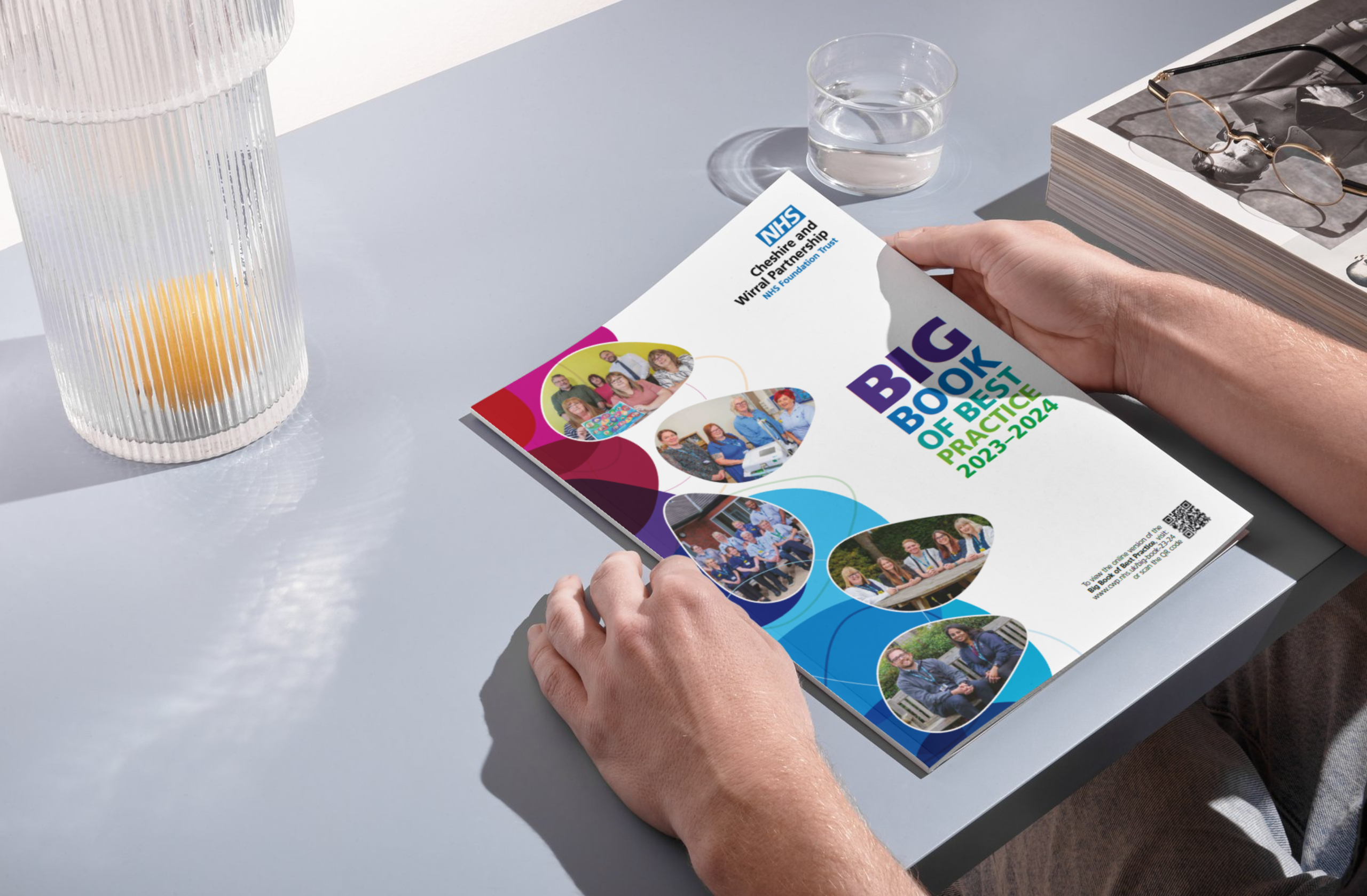Below you can view all the entries that made it into the Big Book of Best Practice 2023-24 from the specialist mental health and all age disability services care group.
Contact details for each project can be found within the entries below. For more information about the Big Book of Best Practice, email cwp.
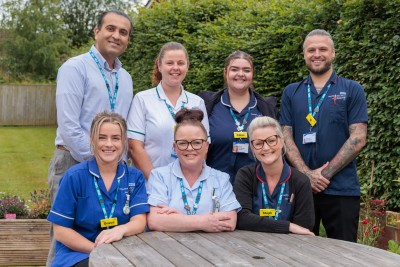
Contact: megan.
What did we want to achieve?
The team wanted to support a patient to develop new skills, promote wellbeing and transition back into the community. This presented many challenges as the patient had not been in the community for eight years and their baseline was unknown to the team. The patient had been in services for several years, had no support network, poor personal care and minimal interactions with others. They were subject to abuse for many years and had not slept in a bed, opting to sleep in a chair instead. The plan, once they were treated, was to find an appropriate placement to suit their needs and develop a graded approach to support them back into the community.
What we did
Staff spent time each day building up a therapeutic rapport and tried to find a common interest. This enabled conversations to develop and graded leave was initiated. The patient was asked what activities they liked to carry out and for the first time since 2015, went back into the community. Staff arranged for them to have a haircut and put a plan in place around personal care, which was led by the patient. The patient allowed staff to take their bloods and have their toenails cut. They began spending time in communal areas, socialising with others. Staff were able to work with the patient and they were able to sleep in a bed for the first time in many years.
Results
Functional assessments were carried out and the multi-disciplinary teams were aware of the patient’s strengths and difficulties. A placement was identified, and the patient was informed and shown pictures to help ease their anxieties. A graded plan was devised with the patient and the placement was given a detailed handover of the patient and what worked well on the ward in terms of their self-care and going out in the community.
Next steps
The patient was discharged and staff went to follow up and see her placement, following the care plan which was devised by the ward. The patient was initiating going out and was coping well with this. The learning from this case was the importance of spending time with patients, despite what handovers are given and to give patients a voice - in this case, this was the first time the patient had been given a voice. It gave them confidence, improved their self-esteem and helped to develop rapports - all useful skills which had not been used in the past.
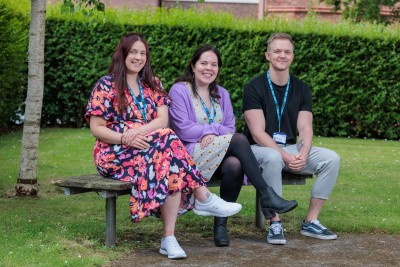
Contact: sarah.
What did we want to achieve?
Working with complexity and high rates of suicidality puts employees at high risk of occupational stress which can lead to issues with retention and patient care. The team wanted to use reflective practice groups, which have an emphasis on the felt experience and dilemmas in clinical work, to see if this can improve staff members’ experiences at work. Reflective practice groups are a form of supervision, and reflective ability is a key part of the national regulating bodies’ codes of practice.
What we did
The whole team agreed that this was something they wanted to develop. Initially a set day and time weekly was agreed, but through feedback and adaptations, this is now fortnightly - alternating between a morning and afternoon slot. It is a one-hour space that all team members are invited to (although it is not compulsory) facilitated by the clinical psychologists within the team. Within the initial meeting spaces, shared group ‘rules’ and ‘boundaries’ were established to create as much psychological safety as possible from the outset. In the space, group members can stay more focused on reflections and the feelings that difficult situations can bring, or they may move towards more of a problem-solving approach, depending on what the person bringing the issue needs.
Results
After approximately eight months, the team completed a formal evaluation of the work using adapted questionnaires called the Clinical Supervision Evaluation Questionnaire and the Appraisal of Supervision Measure. These were circulated via a Microsoft Forms survey to anyone who had attended more than one session. Twelve participants responded. Mean scores demonstrated that participants found the space beneficial to their practice. Key findings were:
- Over 90% felt safe to bring issues to the space; and the same percentage felt there was mutual trust in the space.
- 75% felt that reflective practice aims to improve patient care.
- Over 65% felt it had improved their reflective abilities during and after interactions with patients.
- Over 58% felt it had helped them deal better with stresses at work.
- Over 75% felt it had helped them to feel more confident in their own practice.
As a result, the team was able to conclude that the staff who fed-back value reflective practice and that it may improve both staff wellbeing and patient care.
Next steps
The team plans to continue to offer the space and are working with clinical leads to ensure protected time for all who want to attend. They hope to further evaluate the experience of staff, allowing more qualitative feedback through focus groups. They have started to share findings both internally at the rehab clinical network meetings and also externally. The team has recently submitted a poster abstract to the Royal College of Psychiatry and had discussions with colleagues at Mersey Care NHS Foundation Trust.
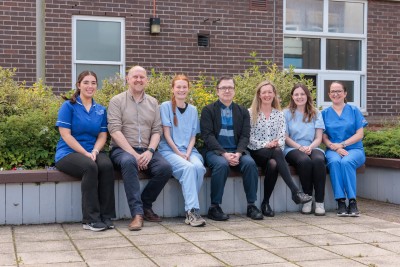
Contact: v.
What did we want to achieve?
Covert administration is when medicines are administered in a disguised format. Medicines could be hidden in food, drink without the knowledge or consent of the person receiving them. This is mostly used across CWP wards caring for patients with dementia. Covert administration might enable treatment to be provided that would otherwise have been impossible or have caused distress to the patient. The aim of this project was to achieve safe, effective and lawful covert administration of medicines across all CWP wards.
What we did
The team audited the practice of covert administration across inpatient CWP services. A driver diagram was generated, looking at covert administration change ideas and a quality improvement workshop was held with multi-disciplinary team members who routinely support patients who need covert medicines as part of their care, to generate quality improvement (QI) change ideas. The pharmacy department delivered training to nurses working on Meadowbank Ward and worked with the Electronic Prescribing and Medicines Administration (EPMA) pharmacist to explore how digital systems could improve covert administration practice.
Results
Audit results highlighted some areas for improvement. For 42% of patients the proposed covert treatment had been discussed by the multi-disciplinary team and a record of the discussion made in SystmOne. The ongoing review of covert administration was done monthly or fortnightly for 14% of patients. For the remaining 86% of patients, it was not clear how frequently this review happened. The results identified there was no minimum frequency of review on the Trust covert care plan. For 24% of patients, the covert administration care plan had been discussed with the patients next-of-kin, and a record of the ‘best interests discussion’ recorded.
Staff feedback from QI workshop included:
- “Beneficial QI project to ensure policy compliance.”
- “Improved awareness of covert medicines processes and thoughts on how to strengthen this.”
- “Has meant I can reflect on how we use covert medication.”
- “Very well-led project - workshops are a great idea.”
Next steps
The project will be shared across the inpatient services at Springview Hospital with the intention to share this more widely through the Trust Medicines Optimisation and Safety Group. This work has led to several change ideas:
- Developed an EPMA covert administration placeholder, which enables covert administration to be clearer and safer.
- EPMA report generated to support ward mangers to monitor covert administration practice.
- Developed a system for pharmacy to endorse electronic medicine charts when covert care plans are in place.
- Develop a training video on covert administration of medicines to support staff.
- Covert champion role to be rolled out across wards.
- Trust covert administration care plan and standard operating procedure to incorporate the workshop change ideas.

Contact: liji.
What did we want to achieve?
Open Dialogue (OD) is a new way of supporting people, which is entirely centred on the individual and their support network. In line with the Triangle of Care principles, it recognises the key role of the person’s social network (family, friends, professionals) in a person’s recovery. OD has been known to improve patient experience, outcomes and recovery. In OD, clinicians have a different role to usual. It is non-hierarchical and its aim is to ‘be with’ the patient, to stay in the moment and to connect to what is being felt in the meeting. While this had been used in different settings, there weren’t any rehabilitation teams using this approach and the Mental Health Intensive Support Team (MHIST) wanted to embed its practice within the CWP’s newly-developing Community Rehabilitation Service.
What we did
The MHIST was fortunate to be one of the two teams within CWP to be provided training for OD. Following this the OD offer was designed within the MHIST, which now forms part of the core clinical model within the Community Rehabilitation Service. All MHIST patients and their social networks are now given the option to engage in OD and access a team reflective space (called InterVision) to support practice. The entire team have been participating in delivering this intervention.
Results
To understand the outcomes of this, the MHIST conducted a semi-qualitative, cross-sectional study of service users who had participated in OD. Feedback was obtained from patients and their social networks. The general themes included feeling understood, improvement in communication and engagement, being able to have open and honest discussions and overall improvement in quality of life. Patients attended fortnightly, every three weeks, or monthly.
- 83% of patients either strongly agreed or agreed that the sessions had helped them feel better supported by those involved in their care.
- 83% agreed or strongly agreed that the sessions improved communication and honesty within their social network.
- All but one of the patients agreed to varying degrees that the sessions had helped them understand their mental illness better.
- Family members and carers felt that it helped them better understand their loved ones.
Feedback from families has included:
- “Everyone’s voices are heard, and everyone is involved.”
Feedback from patients has included:
- “A non-judgemental, safe space to talk.”
- “A close family network.”
- “Frequent contact. An open and honest discussion.”
Next steps
The MHIST are working with CWP Education team to create a two-day training programme as part of the Trust induction around the principles of dialogical practice. Initially this will be available for community staff within the specialist mental health care group with plans to consider rolling it out more widely.

Contact: sophie.
What did we want to achieve?
It is accepted globally that there is considerable stigma relating to the term ‘personality disorder’, which means that often, people with this diagnosis receive a lower standard of care. These people can even be excluded from services due to their diagnosis.
The aim of the Trust-Wide Personality Disorder Training Programme was to deliver education, awareness and skills for CWP staff (and partners outside of CWP) about personality disorder. The hope was that this would reduce some of the stigma associated with this label, as well as improving staff knowledge and confidence when working with this client group. This would therefore improve the experience of individuals with this diagnosis when using CWP services.
What we did
A team of people with lived experience of personality disorder and staff members with a special interest in working with this client group was put together, who then coproduced a tiered training programme consisting of three levels. There are now more than 30 staff members signed up to support with the development and delivery of the training programme. The programme has now been successfully started and 1,080 staff members have been trained.
Results
Staff completed measures pre and post training which explored their confidence, attitudes and knowledge about the diagnosis and treatment. A comparison of pre-and post-measures showed a statistically significant improvement in staff confidence in their ability to work effectively with the client group, in attitudes towards people with the diagnosis, and in knowledge about the diagnosis and treatment.
90% of staff reported wanting to attend further training. After six months, staff were asked to complete a follow-up measure which showed that of the 20 staff members who completed the questionnaire, 74% of staff have changed or might have changed how they work with their clients. The majority of staff believed:
- The training was delivered clearly and appropriately.
- The objectives were met.
- The training will help them to support service users.
- Training was relevant to their role.
Next steps
The plan for the coming year is to roll out a level one e-learning package and roll out level three training (now that enough staff have been trained in level one and level two). Plans have already been made to deliver training outside of CWP with staff from organisations such as Cheshire West and Chester Council.
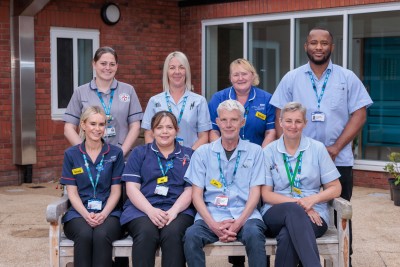
Contact: kirsty.
What did we want to achieve?
New falls technology went live at the end of November 2023 on Silk Ward and has had a positive impact on reducing falls and also reducing the severity of injury sustained from falls since being in use. The previous system was outdated and consisted of bed sensor plates and a pager system, which staff lacked confidence in due it's reliability.
What we did
Bed sensors, floor pressure mats and chair sensors were installed which connected to the Specialist Alarm Services (SAS) system on the ward. The bed sensor is placed on top of a mattress and can be concealed under a bed sheet. When a person moves into a seated position or gets out of the bed, a nurse call alarm will sound, as well as flashing a visual message on the alarm panel to indicate the location to staff on duty.
The floor sensor is placed on the floor and when pressure is applied, the alarm will be activated to alert staff that the patient requires support. Several staff received training on the use of the new equipment and then cascaded this to the rest of the team, following which all staff have reported feeling positive and confident using the technology.
Results
The new falls technology has enabled a quicker response from staff to assist patients who require assistance with mobilising. Data provided by Datix has shown the positive impact the falls technology has had on the ward, with falls reducing since implementation as the technology is much more sensitive, which has reduced delays in attending to patients when movement is detected.
The severity of falls has also reduced, with most falls now being categorised as low-level harm or no harm, as staff are able to respond quicker to the alarms, therefore are able to witness a fall if one was to occur. Enhanced therapeutic observations can be intrusive, however this new technology has supported with the reduction of therapeutic observations at night, allowing staff to follow least restrictive practice.
Next steps
The team is now exploring additional chair and bed sensors and floor pressure mats as the ward currently has six of each. The findings and evaluation of the technology has been shared at the Trust-wide falls meeting in the hope that in the future, the technology will be shared Trust-wide to benefit patients across all localities.
Team: Chelford, Handforth, Alderley Edge, Wilmslow Primary Care Network Mental Health and Wellbeing Team
Contact: lucy.
What did we want to achieve?
The vision was to establish a mental health and wellbeing team for primary care covering a community population of around 50,000. The aim was to have a service for GPs to refer into for patients with mental health needs, ensuring they get the right support, from the right person, at the right time and in the right place, as well as breaking down some of the barriers patients face accessing mental health support.
What we did
The first step was to scope out the needs of GPs and other key stakeholders helping people with mental health difficulties. A proposal paper was agreed and accepted, defining roles within the service. A referral system was developed, considering social prescribing interventions and care coordination input. The seamless referral system developed meant no forms, no waiting lists, and a trusted assessment into Community Mental Health Teams (CMHT).
Results
There is now an all-age offer within the primary care network (PCN) for mental health support, with over 3,000 referrals received last year for mental health and wellbeing interventions. Referrals into secondary care are triaged by the team to ensure the right access for those that need it. One practitioner had 357 referrals in 2023 and only 17 of these went to secondary care (including all specialist teams such as eating disorder and early intervention services), showing a significant decline in the referrals into secondary care.
Patient feedback has been captured at discharge and has demonstrated the impact the team is having, including:
- “It has made me feel safe and comfortable opening up to someone and given me the right direction to work on my mental health for the future."
- "My mental health issues were dealt with quickly and effectively."
- " I was lost to myself and to my family but I was brought back and I’ll be forever grateful! A hero in my eyes!"
The team has been recognised regionally and nationally, and the Chelford, Handforth, Alderley Edge, Wilmslow mental health and wellbeing model has been presented at various CWP events to highlight how a mental health team approach can work within primary care, as well as the benefits, most importantly for the patient. The team was also invited to Parliament to discuss the No Time to Wait campaign.
Next steps
The next steps are to continue to develop the team and focus on wellbeing for staff and patients, and to consider the generation of more proactive work. There are also plans to engage with NHS England’s mental health team, which is reviewing the impact of mental health support in primary care and to be involved more directly with their national review. There are plans to attend the National Good Practice event in Birmingham to discuss mental health within primary care, and to continue to support mental health practitioners (Additional Roles Reimbursement Scheme roles) within CWP and promote the team model.
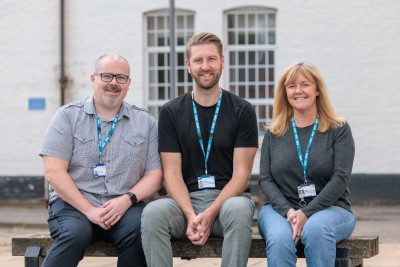
Contact: james.
What did we want to achieve?
One of the ambitions for Talking Therapies services nationally is to increase access. CWP’s West and Central Cheshire Talking Therapies services have been working on increasing self-referral, developing a new website and improving communications with professionals and the public. National data shows 64% of the public are unaware they can self-refer to Talking Therapies. The process must be easy to navigate for patients and health professionals and referrals need to capture high-quality information from the patient, leading to more efficient assessment and administration. Self-referral would also need to ensure referral to the correct service - either West Cheshire or Central Cheshire. The process would also need to be responsive to out-of-area referrals and signpost appropriately.
What we did
West and Central Cheshire Talking Therapy services approached Limbic Artificial Intelligence (AI) – a provider of a brand-new, innovative, NHS-approved tool that had been successfully piloted at Mind Matters (part of Surrey and Borders Partnership NHS Foundation Trust). Limbic provides an AI-powered mental health self-referral tool aimed at increasing self-referrals and reducing both administration and clinical time. Insight was gathered from other services already using Limbic to understand their experience of using the system. The integration of Limbic involved utilising expertise from a range of staff within the service and departments within CWP. These included clinical leads, data leads and representatives from Communications, ICT and Information Governance.
Limbic AI was clinically-tailored to the service’s needs, ensuring clear signposting to services to improve patient experience. It was then vigorously tested and integrated into the new purpose-built website. This was the first integration of the product across two services, ensuring that patients within Cheshire West, Chester and Cheshire East receive the same entry into service.
Results
- Referrals via Limbic since its launch until the end of January 2024: 1,102 overall.
- 823 inappropriate referrals signposted via Limbic to-date.
Referral data comparison 2023 to 2024:
- January 2023: West Cheshire - 579 / Central Cheshire – 619.
- January 2024: West Cheshire - 890 / Central Cheshire – 772.
Increasing access via website and Limbic:
- December paid Facebook campaign: 37,000 impressions, 388 content interactions, 743 link clicks.
- January paid Facebook campaign: 76,375 impressions,108 content interactions, 858 link clicks.
Next steps
- Six-month communications plan – audience-driven to communicate the service and access.
- Integration of Limbic to CWP GP practice websites and development of Limbic AI to include the integration of Choose and Book.
- Involvement in future developments of Limbic AI tools – assisting patient treatment and improving overall patient experience.
- Monthly governance meetings to review Limbic findings and discussion adaptations / developments.
Team: Fitness and Wellbeing Team
Contact: maria.
What did we want to achieve?
The team wanted to provide opportunity for mental health service users on Juniper Ward, who have reduced mobility or may not be interested in traditional gym-based workouts, to participate in a fun and accessible exercise activity.
What we did
The team introduced ‘Sit and Boogie’, a weekly chair-based exercise group on the ward. All service users are welcome to join in as little or as much as they wish. Run by a fitness instructor who leads a series of chair-based exercises, such as marching, arm circles and leg extensions, to music. Service users are involved in choosing songs, which typically includes music from the 70s and 80s, as the group likes to sing along while they move.
The session starts with stretches, which allows the instructor to assess the abilities of the group. This is followed by a full-body dance activity, then upper body and lower body exercises. The instructor always leaves space for freedom of movement and expression. If someone breaks out into their own movement, the rest of the group are encouraged to join in and follow them. Sometimes members of the group will take it in turns being the ‘movement leader’ for the rest of the group to follow, rather than it always being instructor-led.
Results
On average there are between five and seven patient participants each week. Ward staff have noted that the ward visibly lifts in mood during and after this half an hour session meaning, that not only is ‘Sit and Boogie’ good for patients’ physical health, but it has also become a central part of ward activity and helps to boost mood, morale and mental wellbeing.
One service user, who usually spends a lot of time responding to unseen stimuli and struggles to engage in other sessions, often gets up from their chair to dance in the middle of the circle while their peers clap and cheer them on. Another patient, who relies on a walking frame, asked if they could teach the instructor a jive dance after the session and spent the duration of a whole song on their feet, ballroom dancing with gym staff. Patients and staff have said that it is the thing they look forward to most each week.
Next steps
It is hoped that in time, ‘Sit and Boogie’ will be considered part of the therapeutic offer for falls prevention and included in the falls pathway. The plan is to work on linking service users who enjoy ‘Sit and Boogie’ to engage with other falls prevention education, other opportunities for exercise and other therapy activities.
Team: Specialist Perinatal Mental Health Team
Contact: liz.tane@nhs.net
What did we want to achieve?
The Specialist Perinatal Mental Health Service noticed a significant number of referrals into the therapies team requesting support for mums struggling with emotional dysregulation. The team understood the need to offer an evidence-based model to support these referrals. They planned to introduce a perinatal emotional wellbeing group, based on dialectical behavioural therapy (DBT). The aim of the group was to support mums with skills to help them manage difficulties with emotional regulation and distress. DBT focuses on supporting individuals to change unhelpful behaviours and accept their reality. A further aim was to support mums who struggle to make and maintain meaningful relationships, and offer guidance on how to end destructive relationships, recognising the effect that emotional dysregulation can have on the parent-infant relationship and the mother’s confidence.
The group also offered an element of peer support for mums and encouraged the practice of skills between sessions. The group was developed alongside the perinatal teams covering Halton, Knowsley, Liverpool, Sefton, St Helens and Warrington.
What we did
The team used a multidisciplinary approach of professionals including clinical psychologists, assistant psychologists, trainee clinical psychologists, family support workers and mental health practitioners running the group. The group was based off a pre-existing protocol developed by Hannah Wilson, and is known within the service as the Perinatal Emotional Wellbeing Group.
The group format included the four key modules of DBT – mindfulness, emotion regulation, distress tolerance and interpersonal effectiveness. The team created perinatal-specific resources to ensure the group touched on perinatal themes. Each week a handout was provided to draw focus to how the skills introduced are relevant to the parent-infant relationship. A formal work booklet containing the slides, handouts, worksheets and additional resources was also created. These were sent to each person attending, prior to the group commencing. The team codeveloped a planning group across the wider service to monitor progress and gather feedback. The group ran online over a 12-week period and involved two-hour weekly sessions.
Results
Early trends in the data show a reduction in both distress and emotional dysregulation as measured by the CORE-10 and Difficulties in Emotion Regulation Scale. Group members fed back that the group offered a shared understanding and allowed those in attendance to feel validated and heard. The group was described as a safe space to contribute to valuable discussions.
Feedback from one group member included:
- “I really felt that it helped so much and I learnt a lot of new skills. I also had the support from Liz and the perinatal team.”
Next steps
The plan is to run the group on a bi-yearly basis. The team is currently collating data with a plan to move towards a publication in the future to demonstrate the value of this therapeutic intervention within perinatal services.
Honorable mentions
With nearly 100 entries received for the Big Book of Best Practice 2023-24, we have unfortunately been unable to include every entry in the final book. However, many of the projects – despite not being selected for full publication – deserve to be celebrated for the fantastic outcomes achieved.
You can view the honorable mention for the specialist mental health and all age disability services care group below:
-
East Transformation Team - Statutory and voluntary services coming together to help people to feel better and be the best they can be
